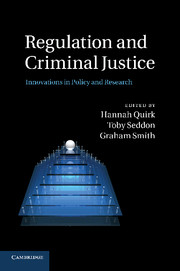Book contents
- Frontmatter
- Contents
- List of figures and tables
- Notes on contributors
- Foreword
- Acknowledgements
- 1 Regulation and criminal justice: exploring the connections and disconnections
- PART I Regulation and criminal justice: framing the debate
- PART II Criminal justice as regulation: responsivity, alternatives and expansion
- 5 Nodal governance and the Zwelethemba Model
- 6 Regulatory compliance: organizational capacities and regulatory strategies for environmental protection
- 7 An intoxicated politics of regulation
- 8 Governing by civil order: towards new frameworks of support, coercion and sanction?
- 9 Counter-terrorism and community relations: anticipatory risk, regulation and justice
- PART III Regulation of criminal justice: monitoring, effectiveness and accountability
- Index
- References
8 - Governing by civil order: towards new frameworks of support, coercion and sanction?
Published online by Cambridge University Press: 04 February 2011
- Frontmatter
- Contents
- List of figures and tables
- Notes on contributors
- Foreword
- Acknowledgements
- 1 Regulation and criminal justice: exploring the connections and disconnections
- PART I Regulation and criminal justice: framing the debate
- PART II Criminal justice as regulation: responsivity, alternatives and expansion
- 5 Nodal governance and the Zwelethemba Model
- 6 Regulatory compliance: organizational capacities and regulatory strategies for environmental protection
- 7 An intoxicated politics of regulation
- 8 Governing by civil order: towards new frameworks of support, coercion and sanction?
- 9 Counter-terrorism and community relations: anticipatory risk, regulation and justice
- PART III Regulation of criminal justice: monitoring, effectiveness and accountability
- Index
- References
Summary
Introduction
This chapter examines new forms of regulating the ‘antisocial’ conduct of individuals in the United Kingdom which have emerged over the last fifteen years. These forms of contemporary regulation have been characterized by a greater emphasis on directive, supervisory and punitive policy tools, including a reliance on sanctions (Schram et al. 2008). What has emerged is a move away from a purely criminal law model to an increasing reliance on other forms of legal regulation of conduct, including hybrid models where criminal and civil law increasingly overlap (Ashworth 2000). There has been a move away from simply increasing sanctions for past ‘bad’ behaviour (whether criminal or civil), towards requiring subjects to submit to programmes which seek to reform their behaviour into the future. While it may be argued that in criminal legal punishment there has always been an element which seeks to reform the offender, what is unique about these new forms of governance is that they are not linked to criminal law sanctions following from conviction by the court, but rather to the civil law (though in some cases criminal sanctions may eventually result for failure to comply).
These developments may be located within a historical tradition of managing marginalized populations and the use of the welfare state and welfare sanctions to reform the behaviour of problematized populations dating back to the late 1800s (Deacon 2004; O'Malley 2009).
- Type
- Chapter
- Information
- Regulation and Criminal JusticeInnovations in Policy and Research, pp. 192 - 210Publisher: Cambridge University PressPrint publication year: 2010
References
- 2
- Cited by



